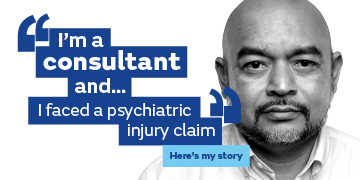Case study: Consultant seeks Medical Protection representation following patient complaint
Post date: 26/06/2023 | Time to read article: 3 minsThe information within this article was correct at the time of publishing. Last updated 28/06/2023
A consultant relies on Medical Protection representation when a complaint to the GMC occurs.
Ms Flinn*, 58 years old with a history of dyspepsia, and recent early satiety and altered bowel habit, consulted Dr Green, a gastroenterologist* and Medical Protection member. A clinical examination, including digital rectal examination, was recorded as normal.
Routine bloods and a chest x-ray (Ms Flinn had a long history of asthma) were normal, so an upper gastrointestinal endoscopy and colonoscopy were recommended. Dr Green documented his discussion around the investigations and the risks involved. Written information about the endoscopic procedures was supplied and Ms Flinn signed a consent form. Specifically, this included a very small risk of perforation which might require emergency surgery.
Bowel preparation was issued, and the scheduled bidirectional endoscopy took place a few days later. This included repeat written consent being obtained.
Thereafter, Dr Green recorded that the colonoscope was inserted up to 25cm and extensive diverticular disease was evident. There was difficulty encountered in negotiating this segment of the colon, with Ms Flinn experiencing pain. A colonic perforation was suspected, and the procedure was abandoned.
Dr Green noted that Ms Flinn’s abdomen was distended, with lower abdominal tenderness but no peritonism. He prescribed broad spectrum intravenous antibiotics, intravenous fluids and opiate analgesia, and advised that she should be kept ‘nil by mouth’. Ms Flinn remained stable and was transferred directly to the radiology department for an urgent CT scan.
Shortly thereafter our member informed Ms Flinn and her relatives that a perforation of the colon had been identified on the CT scan. By this stage Ms Flinn’s abdomen had become more distended and her pain was worse. Dr Green arranged transfer to a nearby emergency hospital surgery was performed later that day. Dr Green contacted the surgeon the following morning, visited the patient several times during her admission and saw her in his clinic shortly after discharge, noting that she had made a full recovery.
What happened next?
Three years later Ms Flinn went on to complain about Dr Green to the General Medical Council (GMC). Ms Flinn was aggrieved about requiring surgery and alleged that the colonoscopy was not carried out competently. She stated that she had suffered physically and mentally as a result, and that her marriage had ended because of the trauma she had experienced.
The GMC wrote to Dr Green to inform him that an investigation had been opened. A copy of the complaint was provided and the GMC asked that Dr Green complete and return a work details form (WDF) within seven days.
Dr Green immediately contacted Medical Protection and his appointed adviser guided him on the GMC process, completion of the WDF, and the immediate steps to take as a result of receiving the complaint.
Thereafter, Medical Protection provided practical advice to Dr Green on reflection, and his adviser subsequently wrote to the GMC on his behalf. Medical Protection was copied into all future correspondence and kept Dr Green updated on the process and what to expect as a result, supporting him at a time when he felt particularly insecure.
The GMC commissioned an independent expert report, which was disclosed to Dr Green and his Medical Protection adviser for comment. The expert was critical of the consent taking process, focusing solely on the consent obtained immediately before the procedure. Medical Protection highlighted that within the earlier consultation, written information was supplied (and forwarded a copy of it) and a thorough consent discussion was performed and form signed, which appeared not to have been seen by the expert. When this was reviewed, the expert agreed that the care had been appropriate.
How it ended
Take aways
In this example, it was clear from the detailed documentation that Dr Green provided to his Medical Protection adviser that he had acted entirely appropriately. Ms Flinn had been fully informed what the procedure involved and of the risks involved as part of a dynamic consent taking process. When it was recognised that the expert had not been provided with the full information, Medical Protection was able to highlight this and achieve swift resolution. This case also demonstrates the importance of clear and accurate documentation, which may need to be relied upon years after the events.
By Dr Roger Palmer, Medicolegal and Dentolegal Services Team Lead at Medical Protection
Not a member already? Click here to join
*Names and locations have been changed to protect member confidentiality.



